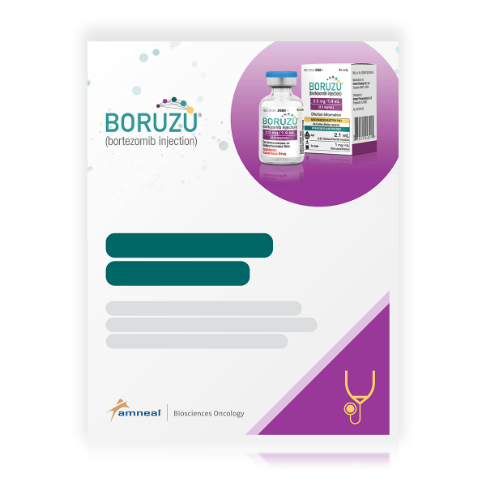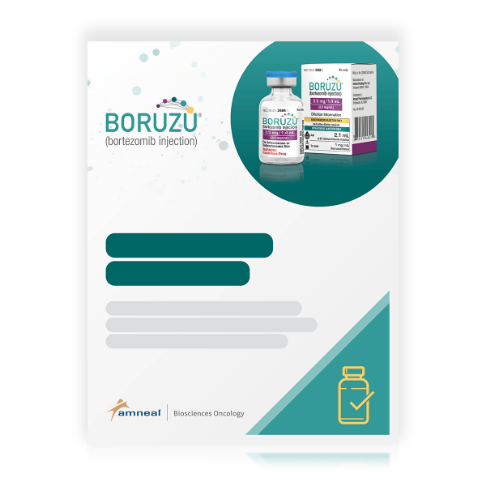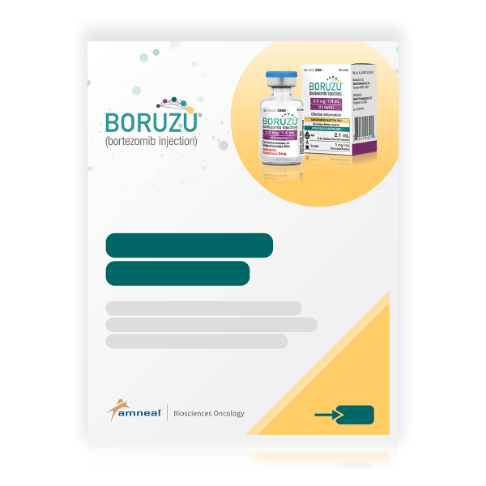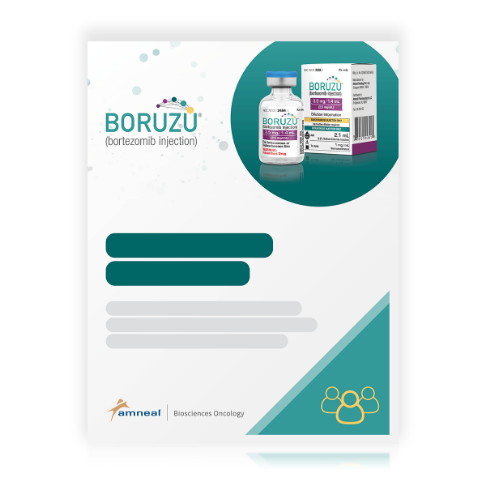INDICATIONS
BORUZU® is a proteasome inhibitor indicated for the treatment of:
- Adult patients with multiple myeloma
- Adult patients with mantle cell lymphoma
DOSAGE AND ADMINISTRATION
BORUZU® is for subcutaneous (SC) or intravenous (IV) administration only. Because each route of administration has a different final concentration, caution should be used when calculating the volume to be administered.
IMPORTANT SAFETY INFORMATION
CONTRAINDICATIONS
- BORUZU® is contraindicated in patients with hypersensitivity (not including local reactions) to bortezomib, boron, or mannitol, including anaphylactic reactions.
- BORUZU® is contraindicated for intrathecal administration.
WARNINGS AND PRECAUTIONS
- Peripheral Neuropathy: Peripheral neuropathy including severe cases may occur. Manage with dose modification or discontinuation. Starting BORUZU® subcutaneously may be considered for patients with preexisting or at high risk of peripheral neuropathy.
- Hypotension: Patients with a history of syncope, patients receiving medications known to be associated with hypotension, and patients who are dehydrated may be at increased risk of hypotension. Use caution when treating these patients.
- Cardiac Toxicity: Worsening and development of cardiac failure have occurred. Closely monitor patients with existing heart disease or risk factors for heart disease.
- Pulmonary Toxicity: Acute respiratory syndromes have occurred. Monitor patients closely for new or worsening symptoms and consider interrupting BORUZU® therapy.
- Posterior Reversible Encephalopathy Syndrome (PRES): PRES has occurred in some patients. Consider MRI upon onset of visual or neurological symptoms; discontinue BORUZU® if suspected.
- Gastrointestinal Toxicity: Nausea, diarrhea, constipation, vomiting, and other signs of gastrointestinal toxicity have occurred. Administration of antiemetic and antidiarrheal medications or fluid and electrolyte replacement may be required. Interrupt treatment with BORUZU® if severe symptoms occur.
- Thrombocytopenia/Neutropenia: BORUZU® is associated with thrombocytopenia and neutropenia that follow a cyclical pattern with nadirs occurring following the last dose of each cycle and typically recovering prior to initiation of the subsequent cycle. Monitor complete blood counts regularly throughout treatment.
- Tumor Lysis Syndrome: Tumor lysis syndrome has been reported with BORUZU® therapy. Patients at risk of tumor lysis syndrome are those with high tumor burden prior to treatment. Monitor patients closely and take appropriate precautions.
- Hepatic Toxicity: Cases of acute liver failure have been reported in patients receiving multiple concomitant medications and with serious underlying medical conditions. Monitor hepatic enzymes during treatment. Interrupt BORUZU® therapy to assess reversibility. There is limited rechallenge information in these patients.
- Thrombotic Microangiopathy: Cases, sometimes fatal, of thrombotic microangiopathy, including thrombotic thrombocytopenic purpura/hemolytic uremic syndrome (TTP/HUS), have been reported in the postmarketing setting in patients who received BORUZU®. Monitor for signs and symptoms. Discontinue BORUZU® if suspected.
- Embryo-Fetal Toxicity: BORUZU® can cause fetal harm. Advise females of reproductive potential to use effective contraception during treatment with BORUZU® and for 7 months following treatment. Advise males with female partners of reproductive potential to use effective contraception during treatment with BORUZU® and for 4 months following treatment. If BORUZU® is used during pregnancy or if the patient becomes pregnant during BORUZU® treatment, the patient should be apprised of the potential risk to the fetus.
ADVERSE REACTIONS
- The most commonly reported adverse reactions (≥ 20%) in clinical studies include nausea, diarrhea, thrombocytopenia, neutropenia, peripheral neuropathy, fatigue, neuralgia, anemia, leukopenia, constipation, vomiting, lymphopenia, rash, pyrexia, and anorexia.
DRUG INTERACTIONS
- Strong CYP3A4 Inhibitors: Coadministration with a strong CYP3A4 inhibitor increases the exposure of bortezomib. Closely monitor patients with concomitant use.
- Strong CYP3A4 Inducers: Coadministration with a strong CYP3A4 inducer decreases the exposure of bortezomib. Avoid concomitant use.
USE IN SPECIFIC POPULATIONS
- Pregnancy: BORUZU® can cause fetal harm when administered to a pregnant woman. There are no studies with the use of BORUZU® in pregnant women to inform drug-associated risks. Advise pregnant women of the potential risk to the fetus.
- Lactation: There are no data on the presence of bortezomib or its metabolites in human milk, the effects of the drug on the breastfed child, or the effects of the drug on milk production. Advise nursing women not to breastfeed during treatment with BORUZU® and for 2 months after treatment.
- Females and Males of Reproductive Potential: BORUZU® can cause fetal harm when administered to a pregnant woman. Advise females of reproductive potential to use effective contraception during treatment with BORUZU® and for 7 months after the last dose. Males with female partners of reproductive potential should use effective contraception during treatment with BORUZU® and for 4 months after the last dose. BORUZU® may affect male and female fertility.
- Pediatric Use: Safety and effectiveness of BORUZU® have not been established in pediatric patients.
- Geriatric Use: Of the 669 patients enrolled in the relapsed multiple myeloma study, 245 (37%) were 65 years of age or older. No overall differences in safety or effectiveness were observed between patients ≥ age 65 years and younger patients receiving BORUZU®, but greater sensitivity of some older individuals cannot be ruled out.
- Renal Impairment: No starting dosage adjustment of BORUZU® is recommended for patients with renal impairment. In patients requiring dialysis, BORUZU® should be administered after the dialysis procedure.
- Hepatic Impairment: No starting dosage adjustment of BORUZU® is recommended for patients with mild hepatic impairment (total bilirubin ≤ 1 × ULN and AST > ULN, or total bilirubin > 1 to 1.5 × ULN and any AST). The exposure of bortezomib is increased in patients with moderate (total bilirubin ≥ 1.5 to 3 × ULN and any AST) and severe (total bilirubin > 3 × ULN and any AST) hepatic impairment. Reduce the starting dose in patients with moderate or severe hepatic impairment.
- Patients With Diabetes: During clinical trials, hypoglycemia and hyperglycemia were reported in diabetic patients receiving oral hypoglycemics. Patients on oral antidiabetic agents receiving BORUZU® treatment may require close monitoring of their blood glucose levels and an adjustment of the dose of their antidiabetic medication.
To report SUSPECTED ADVERSE REACTIONS, contact Amneal Biosciences, a division of Amneal Pharmaceuticals LLC at 1-877-835-5472 or the FDA at 1-800-FDA-1088 or www.fda.gov/medwatch.






